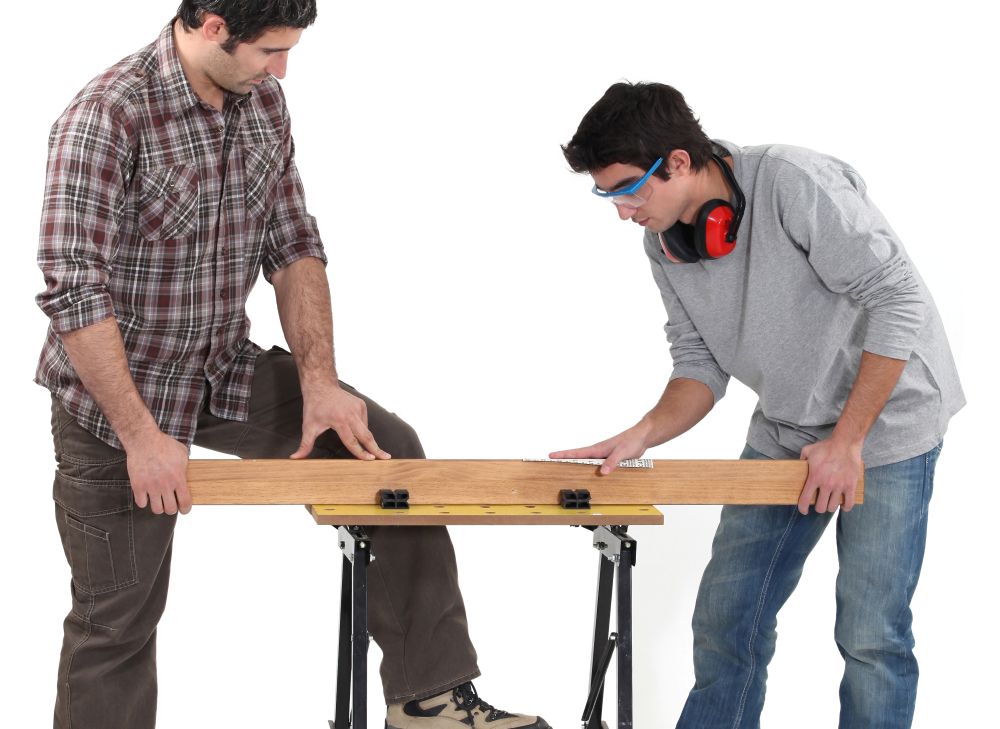 With their new independence and busy schedules, it’s sometimes hard to stay in touch with our teens. But they need our support, and, there are still plenty of times when they want and need to be with us, too.
With their new independence and busy schedules, it’s sometimes hard to stay in touch with our teens. But they need our support, and, there are still plenty of times when they want and need to be with us, too.
Research seems to indicate that when teenagers feel good about the way they communicate with their parents they’re less likely to smoke, drink, use drugs and have early, unprotected sex. In fact, one of the most important reasons teens choose not to use alcohol and drugs is because they don’t want to jeopardize their relationship with their parents!
OK, so it’s important to continue to communicate in a positive, open way, even with an emotionally prickly teen. But how?
Communication with Teenagers is …
- More about listening than talking.
- More about asking questions than giving answers.
- About helping them to form sound values and make responsible decisions in response to the facts.
- About finding common ground.
- About how we behave – what we do communicates far more than anything we say.
If you do get the opportunity to talk
- Communicate little and often.
- Don’t start a war of words. “You’re wrong, I’m right” they will switch off. Instead invite them to dialogue with you.
- Respect the view they bring and then calmly share your own viewpoint. Offer it as ‘food for thought’ not the definitive answer! If nothing else they will be so shocked, it will buy you some thinking time!
- Don’t just ban things! If you do not want your child to do something, be able to offer a sensible and well thought out reason.
It is a skill that improves with practice, one that needs to be worked at. It is important to pay attention to feelings. Listening for feelings makes us more sensitive and understanding. Never forget it is easy to ‘hurt’ a teenager by laughing at them or making fun of them.
It is helpful to reflect back in your own words what you hear. This helps you to establish that you understand what is being said and are on the right track. It also encourages the child to say more. Often a nod or grunt or ‘a ha’ will be enough to do this. It is wise to use silence – say nothing and see where the conversation goes.
Listening builds trust – children will trust an adult who listens, children will find it difficult to talk to:
- Someone who is always busy;
- Someone who reacts immediately by advising “I told you so…”;
- Someone who is always scolding “Why didn’t you do what you were told!”
Physical Listening – Be an attentive listener. Nodding your head from time to time or saying “ummm” lets people know you are listening. Other phrases to encourage someone to keep talking are: “What happened next?”; “Can you tell me more about that?”; and “How did it make you feel?”
Be sure to maintain eye contact while you’re listening. If your eyes wander, your thoughts may wander as well. Maintaining eye contact lets people know you are focusing on what they are saying.
Keep your comments and questions relevant to the situation unfolding before you. Changing the subject causes the conversation to drift, and you will lose your teenagers confidence. He’ll believe you really don’t care, and you aren’t listening. Remain calm and try not to look shocked or dismayed even when you are!
Paraphrasing – To be a good listener, you need to take an active role. Re-word what you have been told so that the one speaking knows you understand. Using your own words to do this shows that you are listening, and that you care about what you have been told.
As you listen, encourage your child to talk by asking open-ended questions. These questions require more than a “yes” or “no” answer.
- Don’t say, “Did you have a good day?” Instead say, “Tell me what happened today.”
- Other types of open-ended questions are: “How did you feel about that?”; “What do you want to do about it” and “What did you do when she said that?”;
- Try not to be the one doing the talking. Teenagers are actually very good at working out solutions to problems when given options.
Empathy – While you listen, use phrases such as: “You sound angry.or It seems you’re not sure what to do next?” This is empathising. It helps to make the person talking feel safe and secure. Teenagers will feel more like confiding in you if they feel they can trust you. You may not agree with your child’s feelings, but you do need to acknowledge them. One of the hardest things is learning neither to over react nor to under react.
Reflect your teenager’s feelings back to her. Be careful not to insert your own feelings into the conversation.
It’s difficult as a parent not to make choices for your teenager. Offer various solutions to the problem, but don’t tell him/her what to do. If you do that and it doesn’t work out, he/she will hold you responsible. By listening carefully and offering several solutions, a teenager can make their own choice and accept ownership of the outcome.
Some good rules to follow as you listen to your teenager are:
- Let the young person tell you the problem in their own words.
- Don’t try to solve the problem, rather offer options.
- Offer hope.
- Keep a confidence to yourself, unless it is a life-threatening situation.
Try a new approach at home:
- Ignore squabbling.
- Spend time connecting with a teenager, being interested in their friends and their World.
- Listen actively instead of scolding.
- Encourage instead of nagging or criticising (look out for increased effort or improvement).
- Withdraw from ‘fights’ – no accusations or blaming.
- Use ‘I’ messages not ‘You’ messages.
- Involve/introduce them to new responsibilities
- Hold regular problem solving sessions to manage tensions and talk out important issues.
- Set limits and follow through on them.
- Negotiate.
- Play the ball – not the man (separate the problem from the person).
- Reject the behaviour – but never reject the young person.
Which kind of parent are you?
- Dominant Parenting is the extreme use of the intervention style of discipline. This parent wants to ‘control’ the children.
- Smothering Parenting is the extreme use of the interaction style of discipline this parent satisfies every whim of the child.
- Permissive Parenting is the extreme use of the non- intervention style of discipline. This parent believes in allowing the children to ‘do their own thing’ and does not set limits to behaviour.
Bob Myers writes: “Extreme use of any of the three parenting styles produces the same problem; Unhappy, discouraged and irresponsible children. The responsible parent will use a mixture of all three parenting styles and at times should lean a little to one style more than the other, depending on the age of the child and the situation.”
He goes on to say: “Teenagers may seem to challenge all your values and beliefs but in fact they only challenge a few. When they challenge one it can be a shock to the system and a parent is faced with justifying a belief or a value that has until then just been accepted and never examined before. You can view the challenge in two ways either as a disaster in which case it probably will become one. Or as the teenager’s contribution to the continuing development of the parent’s thinking, the consequence of which will be much more beneficial to the whole family!”
Finally he says: “Remember:
- Teenager’s can only send parents on guilt trips if parents let them.
- You can change your immediate world by changing your own behavior.
- The child’s ‘faults’ you want to change now may be their strengths in the future.”
It may surprise you to know that even when a teenager starts a sentence with, I don’t know what to do …, they are not actually asking what you think they should do?
I don’t know what to do,does not equal, Please tell me what to do.
If you’re not sure whether you’re being asked to listen or problem solve, listen for awhile and then, simply ask. For example, try something like this “I don’t feel as if I’m helping in any way, do you want me just to listen or do you need some help to solve this? Tell me what you need. That may sound a little odd, but it really works.
If you feel compelled to share your opinion and no one asked you for it, offer it tentatively, Can I tell you what I think? If they say, No,try very hard to accept their wishes. When you do share your opinions, do so with love, tenderness and compassion for they may be frightened and confused or embarrassed.
The longer you are able to keep your own ideas out of the conversation, the more you will be able to focus on what is going on down deep inside this precious person you love.
You also will be making several powerful statements to the one you are listening to:
- I love you enough to really listen.
- I believe in you and know you are capable of solving problems on your own.
- I am here when you need me.
If the words Oh, and there’s one more thing….Start to form in your mind block them out immediately. You are teetering on the edge of a precipice and just about to plunge head first down the mountain of undoing any really good communicating that has happened up to this point! Leave well alone (for now at least!)
Many parents have discovered that when kids are bored, on tedious car journeys or doing mundane tasks like the washing up, they begin talking. They talk and talk and talk.
When that happens the best thing a parent can do is be quiet and listen. This is the chance to let your teenager lead a conversation. Deep down, they want to share their lives with their parents, but they still want to feel in control.
When teenagers open their hearts during these ‘boring-times’ Parents can make the most of the opportunity to evaluate their parenting skills. By listening carefully, you can evaluate how your parenting is influencing them and if your values still shape their lives. It may also give you the opportunity to see what potential trouble lies ahead.
The next time a teenager asks you to take them somewhere, grab your car keys. You may never get a better opportunity to discover what he’s thinking!
Learn to talk on the move!
Teenagers always seem to be on the move. (Once you’ve got them up at around 1 pm that is!) Adults make things happen by talking, and then we move. Teenagers on the other hand are action machines. They’re not as reliant on sophisticated words as we are. They also have the added distraction of being inside bodies pulsing with energy and strength.
If you really want to connect with a teenager, you need to get active. Race them. Challenge them to a game of football or shoot some baskets together, go for a drive or ‘shop til you drop.’ Put the chatterbox in motion while you are moving and doing.
Try to create the right climate
One in which a teenager can feel free to discuss anything with you: sex, drugs, anger, fear, disappointment,
pain, peers, etc. This shows your teenager that you can be of help in solving problems, and they won’t be afraid of speaking out.
Parents need to understand what adolescence is like in today’s society, as well as the pressures and choices adolescents face. Yes, it is hard to catch most teens in a “chatty” mood. However, parents who try will find an opportunity now and again. Just listen and accept the simple truth that a young person feels what she/he feels, no matter how irrational it may sound.
Remember that teenagers need adults who are open-minded, they need guidance now more than ever and occasionally they will ask for it. If they fear their parents will discourage them from being truthful by displaying disappointment and disapproval, they will back off and it may be a long time before they approach again. Just let them talk to you, and demonstrate that you hear what they are saying. If you want to talk, just wait your turn then perhaps they will listen to you.
But she/he won’t talk!
What should you do if your teenager just won’t talk to you? Don’t be too discouraged. Hang in there but don’t push. Respect their right not to talk and be attentive to the things they do want to talk about. A parent may do all of the above and still his/her child will not talk. That’s why you need to maintain good relationships and strong links with friends to whom your children will talk.
Parents will probably gain greater confidence in chatting about the ‘hot’ teenage issues’ with their children if they can increase the opportunities that they have for chatting about these things with other adults.
Wise parents will surround their family with adults who share the same values and beliefs as they do. These ‘other significant adults’ in your child’s life will offer the same advice, encouragement and counsel as you but because it doesn’t come from you it will be strangely palatable!
Don’t be jealous of the special relationships that may exist between your children and other adults, such as other family members, teachers, youth workers and young adults. Ensure that these are safe and appropriate relationships then relax, back off, and give the space your child needs.
This often becomes a reciprocal arrangement. If you have developed good listening skills someone else’s child may well seek you out for that important chat.
Where children are seeking guidance from what you consider to be inappropriate sources – do not set yourself up in competition with that alternative worldview. This will force a child to take sides. Practise your active listening skills, engage in dialogue, and state clearly what you believe without trashing any other opinions that are presented. Do not be drawn into a defensive position. Teenagers can have healthier, more open relationships, when their friends of both sexes are made welcome in their home.
It’s difficult not to revert to old habits, to ‘lose it’ to blame and to shout. However, if you want to develop a healthy relationship with your child, one based on trust and confidence, you must learn to listen.
IF YOU CAN REMEMBER TO:
- LISTEN actively,
- Name your child’s feelings,
- Empathise with those feelings,
- Paraphrase,
- Be attentive,
- Maintain eye contact,
- Ask relevant questions,
- Remain calm and non-judgmental
- Offer reasonable options
YOU TOO CAN BE A BETTER LISTENER!
Be kind to yourself, if at first you don’t succeed – try again.








